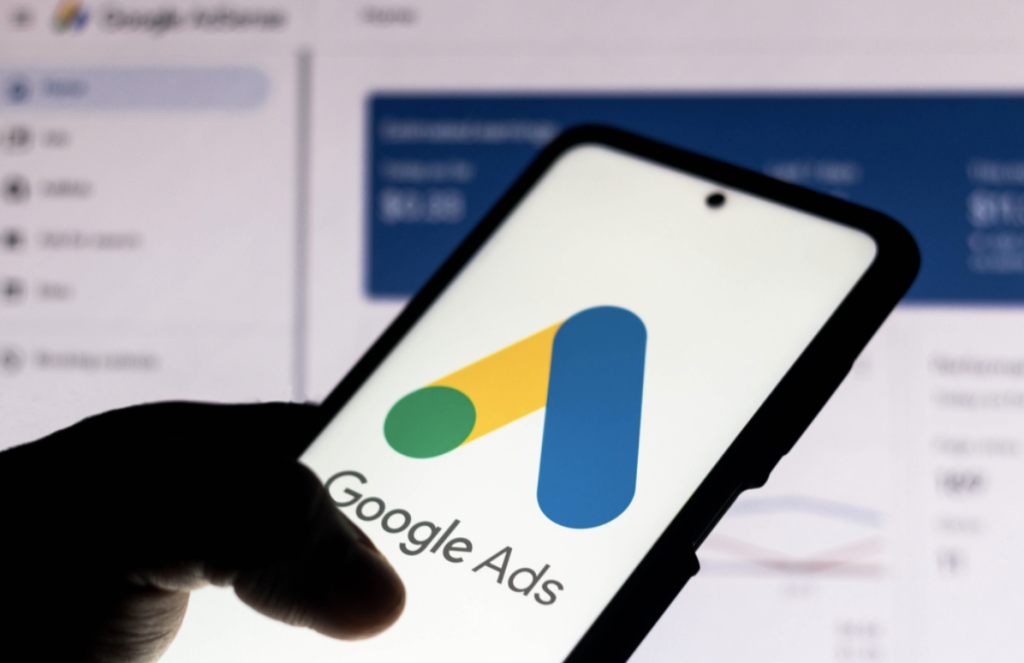Google Ads hold the world’s largest share of digital advertising. It is cost effective and most importantly, provides meaningful results when executed properly. Unlike traditional advertising, such as TV and radio, your minimum budget does not have to be tens of thousands of pounds, making it accessible.
Additionally you’ve full control over where you appear, how often and how much you spend.
In this blog, we will explain how to create a Google Ads strategy for small businesses such as yours.

Why use Google Ads?
Google uses a pay-per-click (PPC) billing model. This means you only pay when somebody clicks on your ads. You can spend as little as £5, thus making it highly accessible for small business owners. It allows you to advertise to new audiences and make sales without spending a fortune.
However, there is a method to achieving results. If it were as easy as a couple of clicks, a Google Ads marketing agency like Growth by Design would not exist.
For the uninitiated, there is a risk of spending a lot of money fairly quickly without a return. Google Ads are definitely an area of marketing where the results speak for themselves between having an amateur doing them for you versus an expert, which is why creating a Google Ads strategy for small businesses is so important.
Segment your audience
As with any advertising, the first step to creating a Google Ads strategy for small businesses is knowing who your target audiences are.
Given access to target thousands of potential customers through Google Ads, many small business owners leap at the opportunity to target everybody in their total market.
However, without segmenting your audience into their respective “parts”, your keyword targeting will be too broad. Potentially pushing your ads to people that won’t find relevance in them. This is a sure fire way of spending a lot of money with limited return and creating a Google Ads account which is hard to manage.
For example, if you are an owner of a flower shop, a Google Ad with only broad-match keywords (like “flowers”) will struggle to attain conversions. Their specific customer segments will have different needs, and thus need to be presented with different ads based on those needs.
You may wish to target by the location of the user making the search, or indeed add a qualifier to the search itself e.g. florist in Sussex.
Depending on your approach to Google Ads for small businesses’ like your own, you may want to qualify it even further by targeting keywords such as wedding florist in Sussex and funeral florist in Sussex. You would want very different ad copy and messaging for both of these, so your strategy immediately starts to expand but is far more likely to bring you relevant leads.

Choose keywords to match your audiences
Keywords are how Google deems an ad relevant to the specific person searching and they are one of the most important aspects of creating a strong Google Ads strategy for small businesses.
Using our earlier example, only using a broad match keyword like “flowers” would potentially mean someone looking for wedding flowers to be presented with a page for Mother’s Day flowers.
Whereas for someone looking for “Christmas wreaths with a bow”, we can use “phrase match” keywords to show them an ad that is truly relevant to their purchasing decision. This means the person searching for Christmas wreaths with a bow will, indeed, be presented with Christmas wreaths with a bow. And naturally, be more likely to purchase.
Considering the differing factors between all your potential customers will allow you to be more careful with the keywords you choose. When working with a client, we take the time in their initial onboarding session to understand the most relevant topics related to their business, thus informing our keyword research for their campaign.
Critically at this stage, the keywords being used need to match the way in which your prospects phrase their queries. So be careful of jargon or industry terminology!
Ad copy and testing
For each of your audiences and keywords, you will need to create relevant, ad copy. Some of these will be sales messaging but some of them might be more informational depending on the search query.
This is your sales pitch to persuade the prospect to click on your ad in the search results. Your Ad could potentially appear alongside other Ads, Google Business Profiles, map results, organic search listings, Shopping Ads and images results. You need well crafted ad copy to make you stand out, show your relevance and get the clicks.
It is good practice to continually test and change up your ad copy. For example, run two different ad copies at the same time and see which one receives the most clicks and conversions. Then create an alternative version of the winning ad copy, and test again. This allows for continual improvement in your click through rate, and more leads for your business!
Bidding strategy
As we’ve already mentioned, it is easy for the uninitiated to spend a lot of money, fast and to little effect on Google Ads. On the flip side, for those businesses that have their strategy well-honed and managed, it’s the lifeblood of their business.
Once you have your audiences, keywords and ad copy, it’s then on to your bid strategy. Although it can be as straightforward as placing a single, flat bid across the board with a daily budget, for the best results something more subtle and considered is needed.
You can adjust the bids depending on users location, devices, time of day and day of the week. Using these features maximise your investment significantly so should not be ignored.

Creating a Google Ads strategy for small business – What to do next
There is a lot of free guidance and advice available on Google Ads available, not least from Google themselves. It may give you the mechanics of how to do it but for it to be successful and deliver meaningful results you need a Google Ads strategy for small businesses, tailored to your budget, objectives and required outcomes.
Google Ads have the potential to significantly grow your business, so it’s best to get experts involved to ensure you get the return on investment you deserve!
Our friendly Growth by Design team has the know-how and experience to ensure that your Google Ads campaign is successful, whatever goals you set out to achieve. To learn more, give us a call today on 01444 810530.



